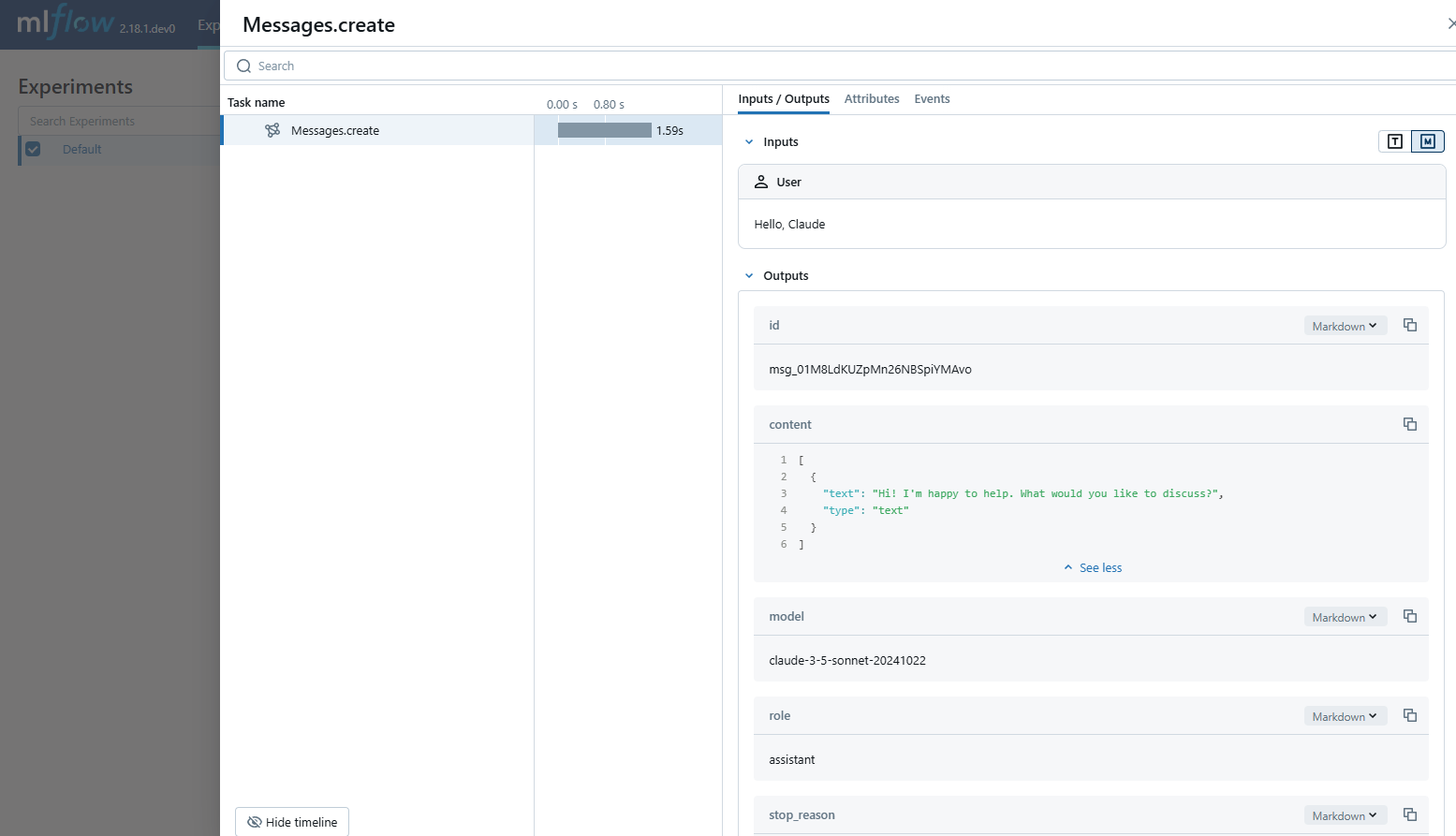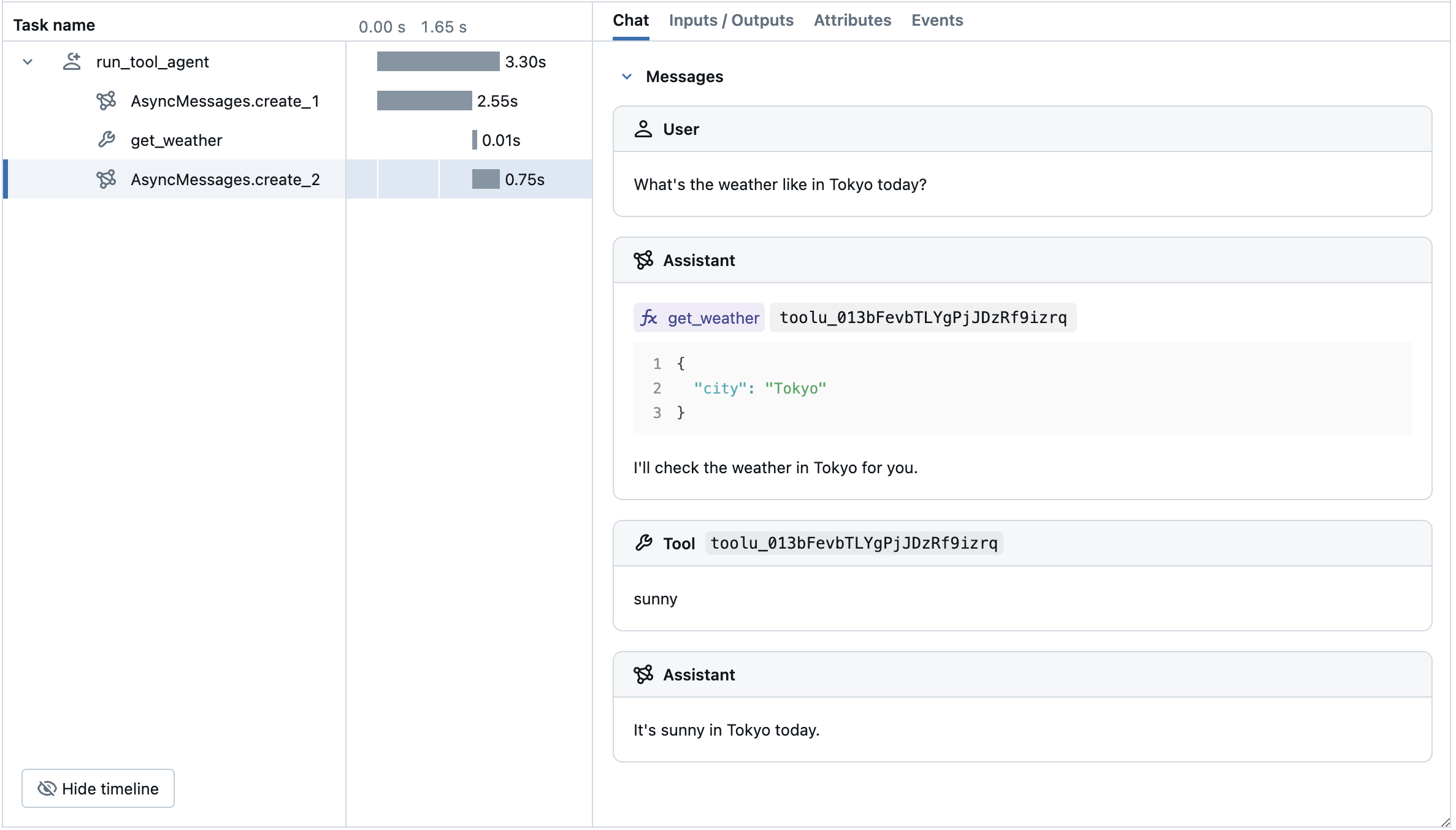
MLflow 跟踪为 Anthropic LLM 提供自动跟踪功能。 通过调用 mlflow.anthropic.autolog 函数为 Anthropic 启用自动跟踪,MLflow 将捕获嵌套跟踪,并在调用 Anthropic Python SDK 时将其记录在活跃的 MLflow 实验中。
import mlflow
mlflow.anthropic.autolog()
MLflow 跟踪会自动捕获有关 Anthropic 调用的以下信息:
- 提示和完成响应
- 潜伏期
- 模型名称
- 其他元数据(例如
temperature,max_tokens如果指定)。 - 在响应中返回时进行函数调用
- 引发的任何异常
注释
在无服务器计算群集上,不会自动启用自动记录。 必须显式调用 mlflow.anthropic.autolog() 才能为此集成启用自动跟踪。
注释
目前,MLflow 人类集成仅支持对文本交互的同步调用进行跟踪。 异步API不会进行跟踪,并且无法记录多模态输入的完整信息。
先决条件
若要将 MLflow 跟踪与人类学配合使用,需要安装 MLflow 和 Anthropic SDK。
开发
对于开发环境,请安装包含 Databricks 附加程序和 anthropic 的完整 MLflow 软件包:
pip install --upgrade "mlflow[databricks]>=3.1" anthropic
完整 mlflow[databricks] 包包括用于 Databricks 的本地开发和试验的所有功能。
生产
对于生产部署,请安装 mlflow-tracing 和 anthropic:
pip install --upgrade mlflow-tracing anthropic
包 mlflow-tracing 已针对生产用途进行优化。
注释
强烈推荐使用 MLflow 3,以获得与 Anthropic 最佳追踪体验。
在运行以下示例之前,需要配置环境:
对于不使用 Databricks 笔记本的用户:设置 Databricks 环境变量:
export DATABRICKS_HOST="https://your-workspace.cloud.databricks.com"
export DATABRICKS_TOKEN="your-personal-access-token"
对于 Databricks 笔记本中的用户:这些凭据会自动为您设置。
API 密钥:确保配置人类 API 密钥。 对于生产用途,我们建议使用 Mosaic AI 网关或 Databricks 密钥,而不是环境变量:
export ANTHROPIC_API_KEY="your-anthropic-api-key"
受支持的 API
MLflow 支持以下人类 API 的自动跟踪:
| 聊天补全 | 函数调用 | 流媒体 | 异步 | 图像 | Batch |
|---|---|---|---|---|---|
| ✅ | ✅ | ✅ (*1) |
(*1)MLflow 2.21.0 中添加了异步支持。
若要请求对其他 API 的支持,请在 GitHub 上打开 功能请求 。
基本示例
import anthropic
import mlflow
import os
# Ensure your ANTHROPIC_API_KEY is set in your environment
# os.environ["ANTHROPIC_API_KEY"] = "your-anthropic-api-key" # Uncomment and set if not globally configured
# Enable auto-tracing for Anthropic
mlflow.anthropic.autolog()
# Set up MLflow tracking to Databricks
mlflow.set_tracking_uri("databricks")
mlflow.set_experiment("/Shared/anthropic-tracing-demo")
# Configure your API key.
client = anthropic.Anthropic(api_key=os.environ["ANTHROPIC_API_KEY"])
# Use the create method to create new message.
message = client.messages.create(
model="claude-3-5-sonnet-20241022",
max_tokens=1024,
messages=[
{"role": "user", "content": "Hello, Claude"},
],
)
警告
对于生产环境,请始终使用 马赛克 AI Gateway 或 Databricks 密钥 ,而不要使用硬编码的值或环境变量。
异步
import anthropic
import mlflow
import os
# Ensure your ANTHROPIC_API_KEY is set in your environment
# os.environ["ANTHROPIC_API_KEY"] = "your-anthropic-api-key" # Uncomment and set if not globally configured
# Enable trace logging
mlflow.anthropic.autolog()
# Set up MLflow tracking to Databricks if not already configured
# mlflow.set_tracking_uri("databricks")
# mlflow.set_experiment("/Shared/anthropic-async-demo")
client = anthropic.AsyncAnthropic()
response = await client.messages.create(
model="claude-3-5-sonnet-20241022",
max_tokens=1024,
messages=[
{"role": "user", "content": "Hello, Claude"},
],
)
高级示例:工具呼叫代理
MLflow 跟踪自动从 Anthropic 模型中捕获工具调用响应。 响应中的函数指令将在跟踪 UI 中突出显示。 此外,可以使用@mlflow.trace修饰器为工具函数添加批注,以便为工具执行创建跨度。

以下示例使用 Anthropic 工具调用和针对 Anthropic 的 MLflow 跟踪实现简单的函数调用代理。 该示例进一步使用异步人类 SDK,以便代理可以在不阻止的情况下处理并发调用。
import json
import anthropic
import mlflow
import asyncio
from mlflow.entities import SpanType
import os
# Ensure your ANTHROPIC_API_KEY is set in your environment
# os.environ["ANTHROPIC_API_KEY"] = "your-anthropic-api-key" # Uncomment and set if not globally configured
# Set up MLflow tracking to Databricks if not already configured
# mlflow.set_tracking_uri("databricks")
# mlflow.set_experiment("/Shared/anthropic-tool-agent-demo")
# Assuming autolog is enabled globally or called earlier
# mlflow.anthropic.autolog()
client = anthropic.AsyncAnthropic()
model_name = "claude-3-5-sonnet-20241022"
# Define the tool function. Decorate it with `@mlflow.trace` to create a span for its execution.
@mlflow.trace(span_type=SpanType.TOOL)
async def get_weather(city: str) -> str:
if city == "Tokyo":
return "sunny"
elif city == "Paris":
return "rainy"
return "unknown"
tools = [
{
"name": "get_weather",
"description": "Returns the weather condition of a given city.",
"input_schema": {
"type": "object",
"properties": {"city": {"type": "string"}},
"required": ["city"],
},
}
]
_tool_functions = {"get_weather": get_weather}
# Define a simple tool calling agent
@mlflow.trace(span_type=SpanType.AGENT)
async def run_tool_agent(question: str):
messages = [{"role": "user", "content": question}]
# Invoke the model with the given question and available tools
ai_msg = await client.messages.create(
model=model_name,
messages=messages,
tools=tools,
max_tokens=2048,
)
messages.append({"role": "assistant", "content": ai_msg.content})
# If the model requests tool call(s), invoke the function with the specified arguments
tool_calls = [c for c in ai_msg.content if c.type == "tool_use"]
for tool_call in tool_calls:
if tool_func := _tool_functions.get(tool_call.name):
tool_result = await tool_func(**tool_call.input)
else:
raise RuntimeError("An invalid tool is returned from the assistant!")
messages.append(
{
"role": "user",
"content": [
{
"type": "tool_result",
"tool_use_id": tool_call.id,
"content": tool_result,
}
],
}
)
# Send the tool results to the model and get a new response
response = await client.messages.create(
model=model_name,
messages=messages,
max_tokens=2048,
)
return response.content[-1].text
# Run the tool calling agent
cities = ["Tokyo", "Paris", "Sydney"]
questions = [f"What's the weather like in {city} today?" for city in cities]
answers = await asyncio.gather(*(run_tool_agent(q) for q in questions))
for city, answer in zip(cities, answers):
print(f"{city}: {answer}")
禁用自动跟踪
可以通过调用 mlflow.anthropic.autolog(disable=True) 或 mlflow.autolog(disable=True) 全局禁用 Anthropic 的自动跟踪。